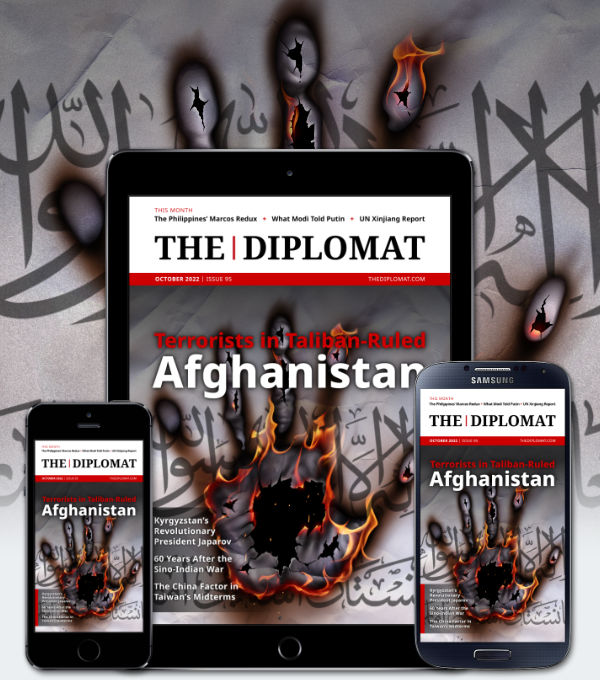| Welcome to the latest issue of Diplomat Brief. This week our top story explores the plight of Kashmiri women who lost their husbands, members of a controversial counterinsurgency militia. We also have an interview with Ming Li Yong, a fellow at the East-West Center, on the (geo)politicization of the Mekong River. |
| Story of the week |  | Society In Kashmir, Counterinsurgents’ Widows Fight to Save Their SonsWhat Happened: Starting in the 1990s, the Ikhwan-ul-Muslimoon, a renegade militia under the command of Kukka Parray, played a critical role in containing anti-India armed insurgency in Kashmir. Due to allegations of abuses and murders, the Ikhwan (most of them former rebels themselves) were shunned by Kashmiri society – and some were targeted and killed. Their widows were left to try and raise children without support from community or government, suffering all the while from the pervasive violence that touches all Kashimiris. Our Focus: Hundreds of thousands of widows of former counterinsurgents remain ostracized by Kashmir’s society – where they are seen as “traitors” – and forgotten by the government. “My husband’s past was used by many to haunt us,” says Biba Zulekha. “I was cursed. There was no empathy from anywhere.” Jameela Begum recounts a similar experience: “Our tragedy is that nobody feels about our suffering. No one sat with us to mourn our loss.” What Comes Next: “Women in Kashmir are among the most affected by this ongoing conflict; not only are they victims, but they are the ones left behind as their husbands and sons take up arms, go to jail, or are killed,” says Dr. Edit Schlaffer, founder and chair of Women Without Borders, an international organization. Most crushing of all is the women’s constant fear that their sons will be radicalized by their difficult experiences and meet a grisly fate: “I do not want my sons to be exploited in any way,” says one widow. “…Fear is everywhere.” Read this story |
| Behind the News | INTERVIEW Ming Li YongMing Li Yong, a fellow at the East-West Center who has researched transboundary water governance and hydropower development in the Mekong River Basin, on the draw of dam-building, despite the ecological cost: “Each government has economic incentives in developing hydropower dams on the Mekong River, and this complex web of interests extends beyond the common narrative defined by upstream-downstream dynamics.” Read the interview |
| This Week in Asia | Northeast Asia North Korea Turns up the PressureSince September 25, North Korea has conducted five rounds of ballistic missile tests – and the latest, on October 4, was the most provocative. A North Korean IRBM overflew Japan, causing Japanese authorities to warn residents in the northeast to seek shelter. It was the first time North Korea launched a missile over Japan since 2017 – and Pyongyang followed that 2017 launch with a nuclear test a week later. Find out more | South Asia Another Deadly Attack on Chinese in PakistanLast week a Chinese Pakistani dentist was shot dead in Karachi, with another two Chinese Pakistani dual nationals injured. The attack was just the latest in a troubling series of murders and attempted murders targeting ethnic Chinese in Pakistan, whose numbers have been rising along with Chinese investment in CPEC. Beijing is increasingly worried that Pakistan is incapable of protecting Chinese nationals. Find out more | Southeast Asia Indonesia Grapples with Aftermath of Stadium DisasterThe emotional and political fallout from the weekend’s deadly stadium stampede continues this week in Indonesia. As distraught families mourn the 125 people who were killed in the tragic incident, the gears of accountability have started to grind forward, with the Indonesian National Police suspending a police chief, nine members of an elite police mobile brigade, and 18 other officers pending an examination into the use of teargas, which reportedly triggered the stampede. The tragedy has also shone an unwelcome light on long-standing problems in the Indonesian police. Find out more | Central Asia Central Asian Economies Surprisingly Resilient in 2022The Russian war in Ukraine has wrecked economies the world over, but Central Asia isn’t doing as poorly as initially expected. Record high gas and oil prices, high demand for migrant workers in Russia, and other factors have allowed the Central Asian region’s economies to make good on Moscow’s misfortunes. But inflation is a serious problem, and social tension could upend the boom. Find out more |
| Visualizing APAC |  | Since 2000, Sri Lanka has signed five – soon to be six – agreements for funding from the IMF, worth a total of $7.8 billion. See the full picture |
| Word of the Week | Politics 날리면Nallimyun (meaning “scrap”) is the word South Korean President Yoon’s office insists he used instead of “Biden” in a viral video clip. Find out more |
| Webinar | The Diplomat Asks What's Next for India's Congress Party?On October 17, members of the Indian National Congress will choose a new leader, with results coming on October 19. The hope among supporters is that resolving the leadership question – and ending the Nehru-Gandhi dynasty – will inject new vigor into India's moribund opposition, which has weathered a series of defeats since losing power to the BJP in 2014. How has the Congress party’s leadership crisis impacted its electoral performance? Will a new leader make a difference? And how is the rest of India’s opposition faring amid the Congress’ struggles? Join us on October 12 at 8 a.m. U.S. Eastern / 5:30 p.m. India Standard Time for a discussion about the future of India’s opposition, and the implications for the country’s storied democracy. Sign up for the webinar |
|  |




